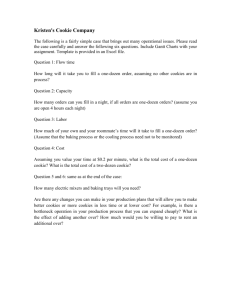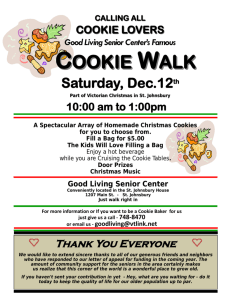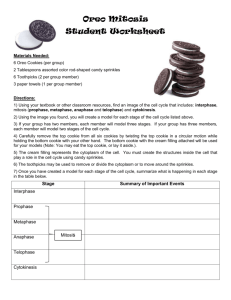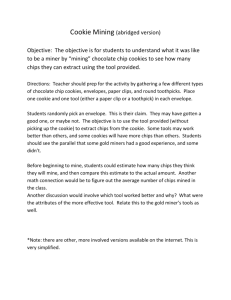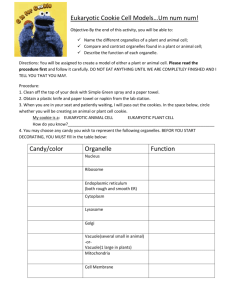AP Psychology Cookie Review: Test Your Knowledge!
advertisement
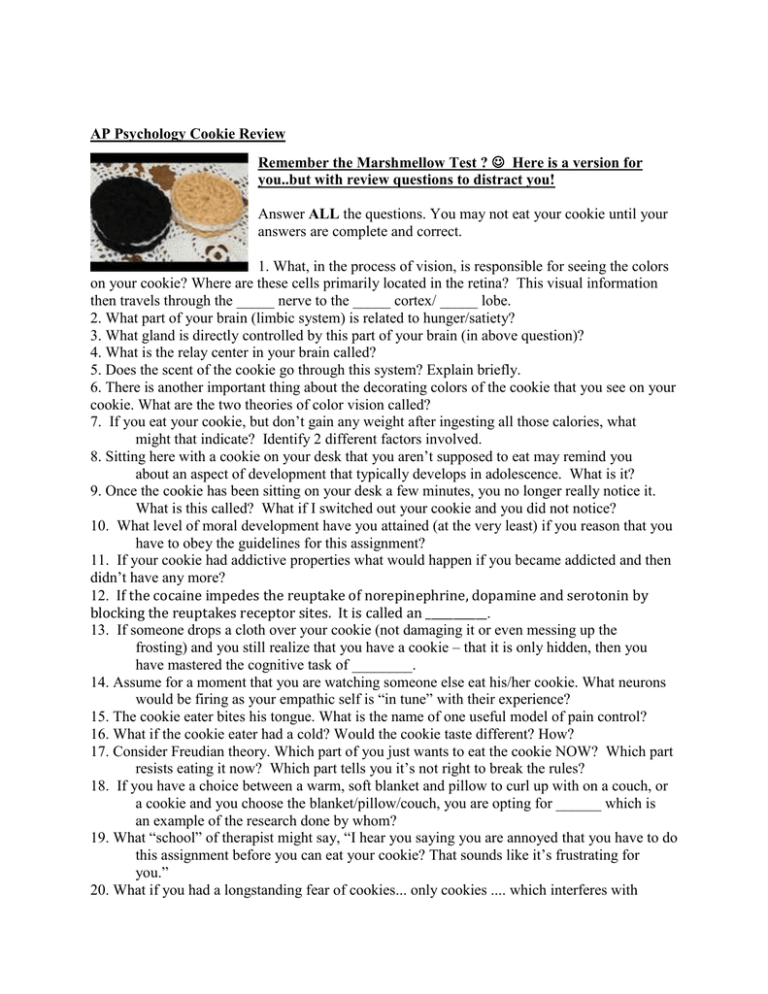
AP Psychology Cookie Review Remember the Marshmellow Test ? Here is a version for you..but with review questions to distract you! Answer ALL the questions. You may not eat your cookie until your answers are complete and correct. 1. What, in the process of vision, is responsible for seeing the colors on your cookie? Where are these cells primarily located in the retina? This visual information then travels through the _____ nerve to the _____ cortex/ _____ lobe. 2. What part of your brain (limbic system) is related to hunger/satiety? 3. What gland is directly controlled by this part of your brain (in above question)? 4. What is the relay center in your brain called? 5. Does the scent of the cookie go through this system? Explain briefly. 6. There is another important thing about the decorating colors of the cookie that you see on your cookie. What are the two theories of color vision called? 7. If you eat your cookie, but don’t gain any weight after ingesting all those calories, what might that indicate? Identify 2 different factors involved. 8. Sitting here with a cookie on your desk that you aren’t supposed to eat may remind you about an aspect of development that typically develops in adolescence. What is it? 9. Once the cookie has been sitting on your desk a few minutes, you no longer really notice it. What is this called? What if I switched out your cookie and you did not notice? 10. What level of moral development have you attained (at the very least) if you reason that you have to obey the guidelines for this assignment? 11. If your cookie had addictive properties what would happen if you became addicted and then didn’t have any more? 12. If the cocaine impedes the reuptake of norepinephrine, dopamine and serotonin by blocking the reuptakes receptor sites. It is called an ___________. 13. If someone drops a cloth over your cookie (not damaging it or even messing up the frosting) and you still realize that you have a cookie – that it is only hidden, then you have mastered the cognitive task of ________. 14. Assume for a moment that you are watching someone else eat his/her cookie. What neurons would be firing as your empathic self is “in tune” with their experience? 15. The cookie eater bites his tongue. What is the name of one useful model of pain control? 16. What if the cookie eater had a cold? Would the cookie taste different? How? 17. Consider Freudian theory. Which part of you just wants to eat the cookie NOW? Which part resists eating it now? Which part tells you it’s not right to break the rules? 18. If you have a choice between a warm, soft blanket and pillow to curl up with on a couch, or a cookie and you choose the blanket/pillow/couch, you are opting for ______ which is an example of the research done by whom? 19. What “school” of therapist might say, “I hear you saying you are annoyed that you have to do this assignment before you can eat your cookie? That sounds like it’s frustrating for you.” 20. What if you had a longstanding fear of cookies... only cookies .... which interferes with your social and/or occupational functioning, what disorder do you likely have? How would you go about treatment? 21. You are thinking, “This is the most beautiful best, most delicious looking cookie in the entire world. If I can’t eat this right now, my head is going to explode!!!” What type of therapist might ask you to consider the likelihood of that outcome? 22. If you are able to eat the cookie in class, with other people around, with significantly less mess than usual, what might be the reason? 23. If you are completely overcome by the amazing taste of the cookie and cannot produce the words to describe it what specific part of your brain is failing you? 24. If you cannot comprehend what someone is saying to you about the cookie what specific part of your brain is failing you? 25. If you watch someone else eat their cookie in an unusual manner and decide to do the same yourself, and are successfully able to recreate their eating style after watching them, you have used what method of learning? 26. What disorder are you showing if you: a. Inspect the cookie. Sweep crumbs off desk. Take tiny bites in an exact circle around the cookie edge. Sweep crumbs off desk. Tiny bites again another concentric circle. Sweep. Repeat 9X more. b. Eat 15 cookies in a 2-hour period and feel sad, frustrated, and feels the to need to rid yourself of those calories. c. Experience an increase in heart rate and flashback to when feel like you are reexperiencing your 5th birthday celebration in school when the whole class surprised you and you wet your pants! d. You’ve been studying for AP exams for the past 3 days. You need little sleep, are incredibly productive, but just bought 5 new study books and the Barons 1000 vocabulary word flash cards. People tell you that you are talking too fast. e. “Maybe the cookie is poisoned.” says the voice inside your head. f. You do a little work. You read some quotes on the wall. You tap your pencil and bounce your knee and think about going out this weekend. You do a bit more work. You get up to go to the bathroom. You come back in the classroom and see your cookie. Man, that looks good. You eat it right away. Oops. That always happens: that acting BEFORE thinking thing. g. You’ve been sleeping a lot lately. Not wanting to eat much. Feeling hopeless about the future. This is probably the last cookie anyone is ever going to make for you. You don’t have any idea how you actually got into college, they must not really have read your application carefully. h. You suddenly find a cookie and a paper on your desk. You don’t remember anyone putting it there and you have no idea why you are sitting in this unfamiliar room. i. You look at your cookie and feel like you have somehow been cheated and you just can’t believe it. How could anyone not give you the very best cookie? How could someone else possibly deserve a cupcake better than the one you have? You reach out and take the cookie from the students next to you and stack it on top of yours, creating a magnificent double-cupcake. Now that’s better. That’s more like it. That’s the way things should be. 27. If your cookie is created for you in recognition of the effort you’ve put forth this year and the learning you’ve accomplished it would be ______ . If it is considered as making your hunger go away, it is ______. 28. What primary taste sensation is your cookie likely to stimulate? 29. What lobe of your brain is working hard to inhibit your motor cortex from grabbing the cookie and taking a bite? 30. If you feel that the cookie was earned and that you were in control of whether or not you received one, you have an ______. If you feel that it was just fate or luck that you got a cookie, it is because you have an _______. 31. My favorite thing about psychology is________. This sentence completion task is an example of what kind of personality assessment? 32. If you believe that you could have made a better cookie than the one that has been provided to you, then you have a feeling of ______ about baking, based on previous experiences (not “confidence”). 33. Consider repeated pairings that have occurred. Tasty snacks cause your mouth to water. Now you have climbed the stairs to the 2nd floor, and on several occasions have had tasty snacks. Because of your associative learning, your schema for psychology has expanded. You retrieve, from LTM, images of jelly beans, smarties, Swedish fish etc. Assuming conditioning has occurred, what is the UCS? UCR? CS? 34. If you fall asleep suddenly during the assignment and never even get to eat your cookie (the rest of the class split it while you were dozing), it could be because you have ______. What stage of sleep were you in when you fell asleep? What kind of brain waves do you have now that you are awake and alert again? 35. What neurotransmitter/pathway has been going crazy in anticipation of the cookie reward? 36. If the cookies are part of an experiment to determine whether chocolate improves memory retrieval, what would be the IV and DV? The experimental and control groups? 37. What ethical guidelines might the above experiment have violated? (Name at least 2.) 38. If you are in a cage and the cookie is outside the cage, whose research are you demonstrating if you have to activate a series of different latches and levers to open the cage door to reach your cookie? What about if you have to assemble a stick out of shorter sticks to reach the cookie and pull it closer? 39. If you became ill immediately after eating your cookie and you were watching a Phillip Zimbardo clip, would you associate your illness with Dr. Zimbardo’s voice? The classroom? Or the cookie? Why? Whose research is this related to? 40. If you eat your cookie and it is fantastic and later when asked about your favorite kind of cookie, you immediately think of the flavor that you had, what mental shortcut will you have just used? 41. Lauren yells “It’s not fair! Chris’s cookie has more frosting. You can feel the difference.” You hold one cookie in each hand. You are correct about which one is heavier 50% of the time. This is called _______? 42. If you are happy about having been given a cookie that you get to eat as soon as you successfully complete a very simple assignment, but then learn that you have to serve detention for being tardy to class, you might get more irritated or unhappy than usual and your happiness is gone. What theory of emotion explains this? 43. If you expect the cookie to taste a certain way, because you have had a similar cookie in the past and you remember the taste very clearly, this would an example of ______. If you are experiencing the taste for the very first time and have no expectations, your perception of it would be _______ instead. 44. You snatch the cookie of the girl sitting next to you, stuff it in your mouth, and RUN as she starts chasing you. Your __________ nervous system of your autonomic nervous is kicked into high gear as you are in “flight.” What is not happening to the cupcake now? (what is “turned off” when you are fleeing?) 45. If all of you do very well on the AP exam AND you all had a tasty cookie, and other students in other schools don’t do well and didn’t receive cupcakes, can I proclaim “cookies increase student AP exam scores?” Why or why not? What are two alternative explanations/other variables that may be involved? 46. You wonder, does this stuff all really relate to what we’ve learned? Is it a ______ measure of our cumulative knowledge? Will it predict our success on the AP exam? 47. You are nearing the end of the assignment and you can feel your heart beating rapidly. You decide that this must be because you are excited about the prospect of finally getting to eat your cupcake. What theory explains why you feel this way? 48. You are stunned at how you have been very successful on this exercise. Name three different methods you used in the original encoding process to facilitate retrieval (think mneumonics): 49. Psychology is the study of __________ and ___________ processes. 50. If this were an experiment and a dog ran in the room and ate all the cookies off the desks in the middle of the period what would the dog be considered? Once you are finished please check your answers and work on the review questions!
